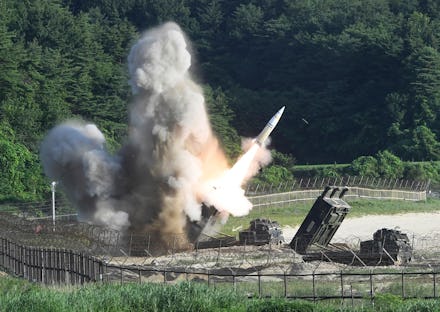5 numbers to help you understand the North Korean nuclear missile launch

This is Mic’s daily read on Donald Trump’s America. Welcome to the political newsletter that hopes you had a safe Fourth of July. Did you speak with a member of Congress about health care yesterday? Please send me an email if you did.
North Korean leader Kim Jong Un’s test of his nuclear capability marks a major advance for a prime foe of the United States. To understand the threat North Korea now poses, here are five numbers you should know:
4,100 miles: The distance North Korea’s latest missile could travel. That’s far enough to hit Anchorage, Alaska, a city of 300,000 people and home to key U.S. military bases.
2: The number of days until President Donald Trump meets with world leaders at the G20 Summit in Germany where North Korea will top the agenda.
Russian President Vladimir Putin and Chinese President Xi Jinping have endorsed a de-escalation strategy in recent days that calls for North Korea to suspend nuclear missile tests while the United States and South Korea halt military exercises. Then, both sides would negotiate how to make the Korean peninsula nuclear-free.
The South Korean President Moon Jae-in spoke favorably of that negotiation approach during his visit to Washington last week. It’s unclear whether Trump or Kim has any interest in that approach. North Korea celebrated the launch on Wednesday and promised further tests.
3: The number of Twitter missives Trump has sent since the North Korean nuclear missile test late on Monday. Trump has repeatedly said in the past that his patience with North Korea is wearing thin, a line repeated by top administration officials. But he has yet to substantially alter U.S. strategy against the isolated country. Instead, Trump has pressured the Chinese to suppress the threat from Kim while continuing military exercises with South Korea.
40: The percentage coal comprised, at last count, of North Korean exports to China. The world’s largest economy is the largest importer of North Korean goods, particularly coal. China said in May it had not accepted North Korean coal for two months. But the Washington Post reported that same month coal appears to be moving from North Korea to China.
China does not want to see a destabilization of the North Korean peninsula, nor does the country want to see increased American military activity off its coastline. The Chinese-North Korean economic relationship is a pressure point Trump can leverage — and a powerful incentive for China to cut ties if Kim goes too far. Trump even critiqued that relationship Wednesday morning.
25 million: The metropolitan population of Seoul, South Korea, one of the world’s most advanced and prosperous cities. In the event of a war on the peninsula, Seoul would be the immediate focal point of a North Korean attack. It is feared that millions of lives could be lost from a barrage of North Korean munitions within hours of the outbreak of hostilities.
Today’s question: It’s widely believed there is no good option for the U.S. when it comes to North Korea. What do you think President Donald Trump should do?
We’re seeking your support to expand our coverage of Donald Trump. As little as a $1 a month will give you access to an exclusive group to interact with Mic journalists and grow our reporting. Learn more here.
What we’re watching:
Today: What’s at stake in the U.S. standoff with North Korea.
More: Key Republican senators are getting an earful from their constituents on health care.
Even more: 44 states have rebuffed the White House’s request for voter information.
Trump’s agenda today: Traveling to Warsaw, Poland.
Back home, senators are hearing from people angry about health care reform
“I heard, over and over again, encouragement for my stand against the current version of the Senate and House health care bills.” That quote in the Washington Post from Sen. Susan Collins (R-Maine) sums up the challenge Republicans face in passing a health care reform plan the nation loathes and moderates fear could end their political careers.
With health care still at an impasse, calls are growing for Congress to cancel its August recess to gain more working days before the end of the fiscal year in September. It’s not just health care the GOP wants to pass this year: Raising the debt ceiling, passing a budget and approving tax reform are all on the GOP agenda for the early fall.
News and insight you cannot miss:
44 states rebuffed a request from Trump’s voter fraud commission to provide all voter information to the federal government. Here’s why government watchdogs are so concerned about those inquiries.
The history of Fourth of July protests.